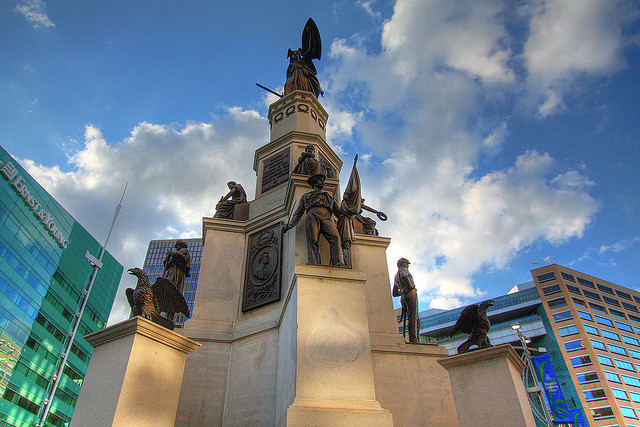Served with honor, if not heroism, but they don’t offer first pitches for that
Are you sitting down?
OK, here goes: Contrary to the current American drumbeat, not all of those who serve honorably in the U.S. armed forces are heroes. In fact, I would guess that very few deserve that epithet, either because they never found themselves in a situation that called for heroism, or because when they did, the instinct for self-preservation prevailed.
This is on my mind because of the opening of the major-league baseball season, with its flag-draped fields, its pre-game rituals honoring “the troops,” and the heroes themselves throwing out the ceremonial first pitches. This, of course, is not unique to baseball. These days a salute to the military can flare up at just about any public event. Somehow, we've become a nation that worships the military. Compare that to the 1960s and '70s, when people in uniform were derided as “baby killers.”
Were the wars in Iran, Iraq and, now, Afghanistan any more just, or any more logical, than the Vietnam War? I don't think so.
Sipping their beers, the spectators at public events large and small now hoot and holler and clap their hands for “the troops.” After all, a little cheering, a slight delay in the main event – that's not too high a price to pay for freedom, is it? And it's certainly easier than questioning the U.S. government policies that land us in wars of dubious purpose.
Before you accuse me of sedition, let me point out, for what it's worth, that I speak from personal experience. I spent two years during the Vietnam War aboard the aircraft carrier USS Forrestal, and was honorably discharged from the Navy in 1969.
Like most people who have served in the U.S. armed forces throughout history, I, aside from a few bar fights and some anti-American rock-throwing Turks in Istanbul, never found myself under hostile attack during my time in the Navy. But danger was always a possibility. In fact, the year before I joined the Forrestal crew, explosions and subsequent fires on the ship in the Gulf of Tonkin killed 134 sailors and injured 62 more.
When, after basic training, I filled out my duty-preference paperwork, I requested sea duty, while most of my mates sought stateside shore duty. I knew that serving on a ship was more likely to put me in harm's way. So, did asking for sea duty make me a hero? Not remotely. I was motivated not by patriotism, but by a thirst for adventure. I was 18 and barely had been out of Detroit. That last thing I wanted was to spend my hitch clerking in Norfolk, or Washington, D.C.
I mingled with sailors mostly, but met soldiers, Marines and airmen along the way. Many, like me, signed up simply because they were looking for something new and exciting. Some were avoiding the draft, and an automatic ticket to the infantry in Vietnam. Some joined as an alternative to prison. Some were itching for a fight. Some were in because their fathers and grandfathers were in. Some couldn't really say why they were there. And some felt an honest-to-goodness obligation to serve their country.
There might have been some heroes among these troops, but I would guess that most of them, if not all, served their time honorably, but not heroically, before returning to civilian life.
It's often been said that people need heroes. Maybe that's because we want to believe that humans - all of us, perhaps - are capable of willingly putting ourselves in jeopardy for the benefit of others.
No doubt the current pro-military fervor can be attributed, at least in part, to the suspension of the draft. It's much more convenient for us to support the troops, and their dubious missions, when we know that we, or our loved ones, can't be pressed into service in dangerous places. Those who serve do so voluntarily. As long as we can keep it that way, let's cheer them on; let's call them heroes.
We toss the word around like confetti. It's used to describe not only everybody in a military uniform, but firefighters, police officers, teachers, a group of third-graders who raise money for a hospitalized classmate, and, yes, athletes. So, the word becomes more and more diluted, which eventually renders it meaningless. If everyone who volunteers for the military is a hero, then what do we call the person who risks enemy fire to drag his wounded comrade to safety?
A superhero?
See what new members are saying about why they donated to Bridge Michigan:
- “In order for this information to be accurate and unbiased it must be underwritten by its readers, not by special interests.” - Larry S.
- “Not many other media sources report on the topics Bridge does.” - Susan B.
- “Your journalism is outstanding and rare these days.” - Mark S.
If you want to ensure the future of nonpartisan, nonprofit Michigan journalism, please become a member today. You, too, will be asked why you donated and maybe we'll feature your quote next time!


 It is one thing to die for one’s country, but quite another to serve. Let’s reserve “hero” for the ones who truly earn the title. (Photo by Flick user Al R; used under Creative Commons license)
It is one thing to die for one’s country, but quite another to serve. Let’s reserve “hero” for the ones who truly earn the title. (Photo by Flick user Al R; used under Creative Commons license)